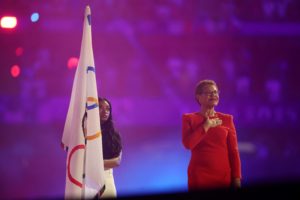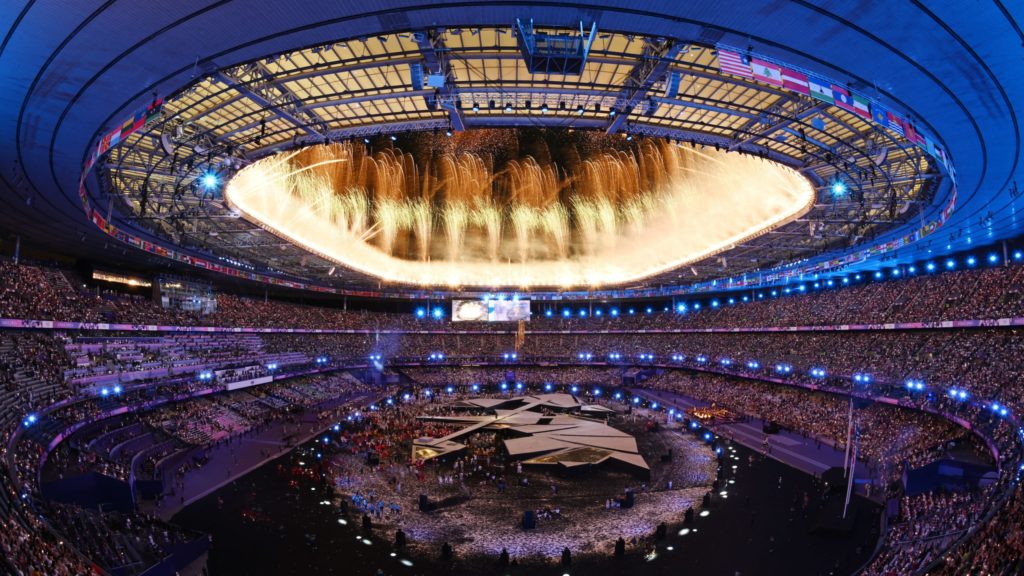Paris wrapped its Olympic Games bursting with pride, closing the Games at Stade de France -- a more traditional setting than the Seine River, where the opening ceremony took place.
Headlines in the French press reflected what most of the country thought watching the final parade of athletes Aug. 11, with Le Parisien saying the Olympics were a "huge popular success," with "events sumptuously integrated into historic sites." The "organizers had set the bar very high to make these Games the most beautiful in history," the daily newspaper said.
Until the very last moments of the competition, emotions were high as the U.S. beat host France in the women's basketball final, the last event of the Summer Games. The U.S. won the overall medal count, and each medal contains 18 grams of iron from the Eiffel Tower itself.
As the Olympics move from the City of Love to the City of Dreams, Los Angeles, in 2028, multi- medalist gymnastics star Simone Biles, who was raised Catholic, was given the Olympic flag to hold by LA mayor Karen Bass as H.E.R. sang the U.S. national anthem at the closing ceremony.

Catholic France is also praising the Olympics, with the turnout for the Holy Games -- an initiative to accompany athletes and visitors during Olympic and Paralympic Games with faith and prayer -- proving successful.
Auxiliary Bishop Philippe Marsset of Paris was at the heart of the Holy Games as the official representative of the Archdiocese of Paris to the Olympic Games.
"The whole thing has gone very well on the ground so far," Bishop Marsset told OSV News. "We had imagined Holy Games as a kind of extension of the missionary thrust of World Youth Day, and that is definitely how they have been experienced."
Even though far fewer young people volunteered for the initiative than the archdiocese had hoped for, with security concerns and warnings of unbearable traffic stopping young people from signing up for Holy Games volunteering, Bishop Marsset said that they are not "disappointed by what we experienced."
"I told the young people in a homily that we are like the young boy who brought Jesus five loaves (of bread) and two fish, when there were thousands of people to feed. It did not seem like much. But Jesus multiplied them and fed the whole crowd," he said.
Paris' auxiliary is now preparing for the second part of the Holy Games, organized around the Paralympic Games, which will take place from Aug. 28 to Sept. 8.
A dozen Christian associations that care for disabled people, such as the Sovereign Order of Malta or St. John of God Brothers will take charge of hospitality days for the athletes with disabilities. Volunteers will welcome them in parishes after they attend sporting events in the morning.
Bishop Marsset is especially waiting for the cécifoot game, or blind soccer, which gathers blind players around a ball that emits sounds thanks to bells. "It is spectacular," Bishop Marsset told OSV News. "These are great moments of communion. Spectators applaud by waving their hands, not clapping them, so that they don't prevent the athletes from hearing the ball," he said.
After the matches, lunch will be provided by Catholic parishes, and in the afternoon, a disabled athlete will come and talk about his or her experience and faith, before the celebration of Mass.
Even though the Holy Games required endless hours for preparation, planning and organization, Bishop Marsset said that "these initiatives are a starting point," as French bishops are currently "in the process of creating a structure that will last" and will work on creating a federation "of associations, parish groups and Catholic schools, which are linked to sport."
Bishop Marsset said that the "idea is to work together on ways to help young people draw closer to the Gospel, which embodies many of the values they experience through sport, such as a sense of effort, the search for excellence, team spirit and caring for others."
The name is still to be decided, but "Holy Games After" or "Holy Games Plus" are among the options.
Before the next Summer Games to be organized in LA in 2028 -- the U.S. Catholic delegation did not waste time in Paris. The U.S. bishops' conference representatives met with Bishop Marsset and his team and discussed Holy Games initiatives.
Father Joe Fitzgerald, a former member of the U.S. national handball team was among them, He took part in the 1996 Olympics in Atlanta, before following his priestly vocation and entering the seminary.
In preparation for the LA Olympics, Father Fitzgerald, a priest of the Diocese of Rockville Centre, New York, will be returning to the U.S. with the wooden cross, blessed by Pope Francis, which was installed during the Paris Games at La Madeleine, the iconic church in the heart of the French capital dedicated to athletes.
Asked by OSV News about the controversial opening of the Games in which the world saw the parody of Leonardo da Vinci's painting of the Last Supper by drag queens performing at the table, Bishop Marsset said he now prefers to focus on the many good memories. "It was more cultural than sporting," he said of the opening ceremony. "The setting on the Seine, in front of magnificent, emblematic Paris monuments, was extraordinary and unique. Some of the artists took advantage of it and enjoyed themselves."
He said that the very idea of Olympism was mocked during the opening ceremony.
"Quite apart from the religious aspect, they took little account of the Olympic spirit of sport and the universal dimension of the event," Bishops Marsset told OSV News.
He also highlighted that for him something very special was the interreligious "wonderful meeting" organized Aug. 4 on the square in front of Notre Dame Cathedral between leaders of religions whose chaplains welcomed the athletes to the Olympic Village.
"This celebration, which we have been working on for over a year, seems to me to reflect what faith and Olympism have in common, far from all the controversy surrounding the opening ceremony", he told OSV News.
Bishop Marsset said that the lasting legacy of the Games will be also forever imprinted in the now-rebuilt Notre Dame Cathedral.
The bronze bell that was specially cast for the Olympic Games and installed in Stade de France, in Saint-Denis, north of Paris -- which the athletes rang every time an Olympic record was broken -- "will be mounted on top of a Notre Dame tower after the Games," Bishop Marsset said.
"The bell will represent the Olympic Games' contribution to the rebuilding of Paris' Cathedral. It will ring for its reopening on December 8," he told OSV News. For Bishop Marsset, it is "an opportunity to rise above the controversies that marked the opening of the Games."

